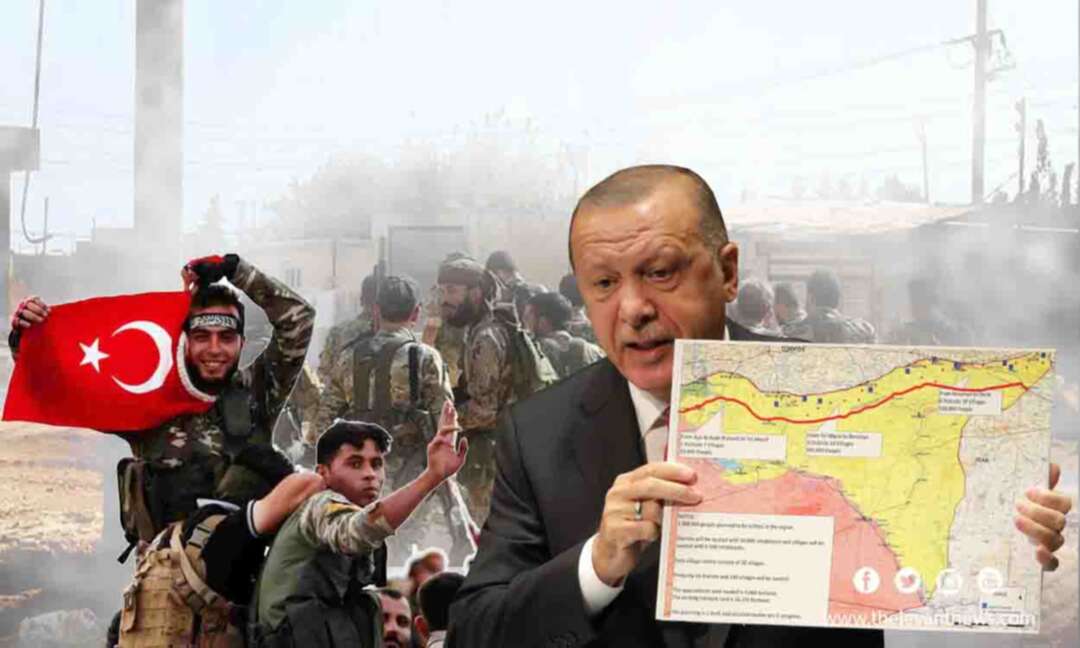-
Amounts to War Crimes.. Turkish Airstrikes Deprive Million Syrians of Water and Electricity
-
Targeting Water and Electricity Infrastructure Reveals Systematic Pattern in Turkish Policy, Exceeding Military Objectives to Directly Impact Civilian Lives

A series of Turkish airstrikes targeted infrastructure in drought-stricken northeastern Syria, depriving over a million people of water and electricity access, in practices legal experts say may violate international law.
A BBC investigation documented Turkey conducting over 100 attacks between October 2019 and January 2024, targeting oil fields, gas facilities, and power stations in Kurdish autonomous administration areas in northern and eastern Syria.
The attacks exacerbated the humanitarian crisis in a region already suffering from internal armed conflict and four years of severe climate change-related drought.
The water situation severely deteriorated following attacks on electricity facilities last October, causing the main Allouk water station to cease operations since then.
BBC documented residents' water access struggles during two field visits.
The autonomous administration previously accused Turkey of seeking to "destroy our people's existence." Over a million people in Hasakah province, who relied on Allouk station, now depend on water tankers from areas 20 kilometers away.
Hundreds of tankers arrive daily, with the water authority prioritizing schools, orphanages, hospitals, and most vulnerable groups. BBC documented Hasakah residents pleading with tanker drivers for water.
Tanker driver Ahmed Al-Ahmad stated: "Water here is more precious than gold. People need more water; all they want is water." Residents admitted fighting with drivers, while one woman threatened: "If [the tanker driver] doesn't give me water, I'll puncture his truck's tires."
Yahya Ahmed, City Water Council Co-Director, warned: "Let me tell you frankly, northeastern Syria faces a humanitarian catastrophe."
Power transmission stations in Amuda, Qamishli, Darbasiyah, and the main Suwaidiyah station were bombed between October 2023 and January 2024. BBC confirmed damage through satellite imagery, witness recordings, media reports, and field visits.
The UN attributed strikes in Suwaidiyah, Amuda, and Qamishli to Turkish forces, while humanitarian organizations indicated Turkey's responsibility for the Darbasiyah attack.
Legal experts agreed with this assessment. Lawyer Aref Ibrahim said: "Turkey's attacks on power infrastructure had a devastating impact on civilians, potentially constituting a serious violation of international law."
International criminal lawyer Patrick Crocker emphasized: "Indicators of international law violation here are so strong that prosecution authorities should investigate."
Hasakah residents expressed feeling abandoned. Water Testing Department Head Othman Qaddu said: "We made many sacrifices, many died during battle, but no one comes to save us. All we ask for is drinking water."
Levant-BBC
You May Also Like
Popular Posts
Caricature
BENEFIT Sponsors BuildHer...
- April 23, 2025
BENEFIT, the Kingdom’s innovator and leading company in Fintech and electronic financial transactions service, has sponsored the BuildHer CityHack 2025 Hackathon, a two-day event spearheaded by the College of Engineering and Technology at the Royal University for Women (RUW).
Aimed at secondary school students, the event brought together a distinguished group of academic professionals and technology experts to mentor and inspire young participants.
More than 100 high school students from across the Kingdom of Bahrain took part in the hackathon, which featured an intensive programme of training workshops and hands-on sessions. These activities were tailored to enhance participants’ critical thinking, collaborative problem-solving, and team-building capabilities, while also encouraging the development of practical and sustainable solutions to contemporary challenges using modern technological tools.
BENEFIT’s Chief Executive Mr. Abdulwahed AlJanahi, commented: “Our support for this educational hackathon reflects our long-term strategic vision to nurture the talents of emerging national youth and empower the next generation of accomplished female leaders in technology. By fostering creativity and innovation, we aim to contribute meaningfully to Bahrain’s comprehensive development goals and align with the aspirations outlined in the Kingdom’s Vision 2030—an ambition in which BENEFIT plays a central role.”
Professor Riyadh Yousif Hamzah, President of the Royal University for Women, commented: “This initiative reflects our commitment to advancing women in STEM fields. We're cultivating a generation of creative, solution-driven female leaders who will drive national development. Our partnership with BENEFIT exemplifies the powerful synergy between academia and private sector in supporting educational innovation.”
Hanan Abdulla Hasan, Senior Manager, PR & Communication at BENEFIT, said: “We are honoured to collaborate with RUW in supporting this remarkable technology-focused event. It highlights our commitment to social responsibility, and our ongoing efforts to enhance the digital and innovation capabilities of young Bahraini women and foster their ability to harness technological tools in the service of a smarter, more sustainable future.”
For his part, Dr. Humam ElAgha, Acting Dean of the College of Engineering and Technology at the University, said: “BuildHer CityHack 2025 embodies our hands-on approach to education. By tackling real-world problems through creative thinking and sustainable solutions, we're preparing women to thrive in the knowledge economy – a cornerstone of the University's vision.”
opinion
Report
ads
Newsletter
Subscribe to our mailing list to get the new updates!






















